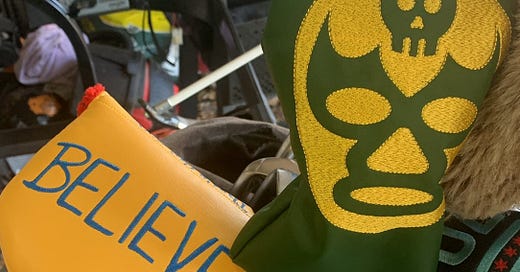Wordle has been taking over my golf chat recently. It’s a fun game where you have six guesses to find a 5 letter word. After a guess, the game reveals if you got a correct letter, and then if the letter is placed correctly. It’s simple, it’s fun and you can win without a ton of strategy. So I’ve done the only logical thing and completely over-thought it.
One of the interesting aspects of sharing a Wordle win is you get to see how people guessed, even if you can’t see what they guessed. (Example below)
🟨⬜⬜🟨⬜
🟨🟩⬜⬜⬜
🟩🟩🟩🟩🟩
A quick analysis of peoples guesses (I said I over thought this, didn’t I?) reveals a pretty standard guessing strategy, as far as I can tell. The first guess tries to reveal a few letters used, and then the subsequent guesses are an attempt at refinement. The focus is always on creating the correct word. The focus is always on guessing the word, versus eliminating options.
My strategy has always been to guess a word, and then build off the success from my first guess. Move around the yellow letters until they turn green and I do not use letters that come up gray. It’s simple, and thus far it has been successful. The logic makes sense, take the letters we know are right and continue to use them until we have the right answer.
I am not convinced this is the optimal strategy. If you want to lower your average guesses, I think we can refine our strategy and make our play more efficient. If your second guess contains none of the letters of the first word, it’s both guaranteed to be wrong (assuming you got one letter correct) and likely to make solving the puzzle faster. You can solve the puzzle faster by eliminating wrong answers, instead of just building on what you already have.
If instead, you took a look at the letters you did get right, made two guesses about what the word might be and then combined 5 of those letters to “test” both words, you will end up with more information. By sacrificing a turn on a play that can’t win, you are gaining an advantage towards your end goal.
It’s easy to default to the solutions we already have, especially when it works. WIth a letter or two, we can brute force our way to a solution. If it works, why change it? We tend to focus on the parts that are correct, even if they are a little bit off. You take the two letters that are correct, but in the wrong place and make your next guess. Hoping the positions are correct this time, or that you stumble upon more letters (or the correct answer)
Golf strategy is more complicated. There are not 26 options to fit 5 boxes, with some options likely being a better choice. Golf is not only difficult, but it’s a hobby. It’s something we do for fun, so any strategy we develop has to keep that in mind. I love finding shortcuts and best practices. Solving Wordle by making better guesses each turn bothered me because it felt inefficient. While I enjoyed improving my Wordle strategy, it changed my enjoyment of Wordle itself. It moved from guessing random words, using letters from the previous guess to a more calculated system where I was eliminating wrong answers. I still enjoy it, but my experience is different.
With golf, I have had a similar experience. Learning DECADE and listening to Scott talk about golf strategy was not only eye opening, it was enjoyable. Taking what I had learned and applying it to the golf course has been a different story. It is hard for me to commit to targets where a perfect shot ends up in a worse position than an OK shot. Pitching out to safety and trying to give myself a putt for par seemed boring. I enjoy the strategy side, but actually executing the strategy on the course has changed my experience with the game.
I am no longer just finding the ball and then trying to get it as close to the hole as possible. There is a certain joy in this type of play, but it came at the cost of my overall improvement. It was worth it to me to sacrifice the joy of swinging away to move to a more strategic approach, but it is something that I am still working on. Fortunately, part of my strategy is still smashing my driver whenever it is appropriate, so that has helped.
Success on the golf course has helped change that mentality, as well. Lowering your Wordle solve average is a hard metric to track, and not something you can immediately see. Having a mediocre round come in a few shots lower than it normally would is fairly obvious. Thinking through each shot, and making choices based on my overall strategy has quickly paid dividends. Good shots are still rewarded, but mistakes tend to not only punish me less but also make me less frustrated.
Innately, we know when we tee off it will take multiple shots to finish the hole. So the question becomes, do we embrace the strategy that gets us there faster on average, or do we try to find a shortcut that works this one time. I have spent most of my golf career chasing shortcuts. While the exhilaration of pulling off an impossible shot is hard to beat, I have found a consistent joy in simply making the best choices and trying to execute my strategy to the best of my ability. My Wordle strategy is still up in the air.


